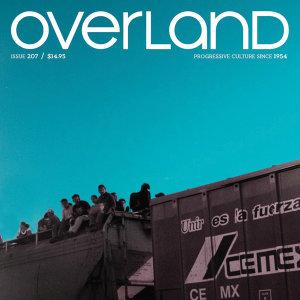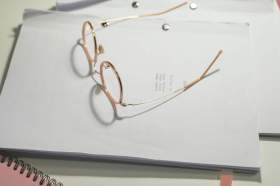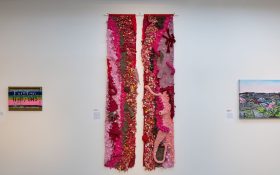The sentiments of Overland editor Jeff Sparrow contained within the Winter 2012 edition are but a prelude to the thought-provoking and confronting, but utterly necessary dialogues that take place throughout the journal. Feature articles on a breadth of issues, from the horrific ordeal of America’s immigrants down South and fat activism, to the unprecedented rise of humanitarian intervention and the focal point of the women’s movement are peppered amidst short stories that detail the pain of losing a child and the parallel threads of poverty and crime within the Asian-centric suburb of Cabramatta, amongst others.
Fronting the wealth of content is ‘Waiting on the Arriage-Ixtepec’, a long-form feature on Central American migration into America. Captivating from the outset, journalist Matthew Clayfield adeptly conveys the desperation and hopelessness that propels many a Central American to voyage onto the infamous ‘el tren’ to the cartel-controlled state of Veracruz, where many are “beaten, sexually assaulted, robbed, extorted, kidnapped or killed” on their way to America. Grim statistics on the number of ‘indocumentados’ who actually succeed in reaching their final destination are interwoven amongst Clayfield’s notable encounters with two young men looking to make the journey – the softly spoken Honduran teacher Andres and the young Guatemalan Estuardo. As the ‘indocumentados’ lugubriously wait and wait for ‘el tren’ to arrive, the measured pace of the piece only heightens the anxiety and anticipation one feels in expectation of events to come. A heart-wrenching snapshot into the perils of illegal immigration and the social ills of the illicit drug trade, this issue’s first feature is a standout.
Other highlights included Jennifer Lee’s ‘A Big Fat Fight’, and ‘Porn and the Misogyny Emergency’ by Gail Dines and Sharon Smith. Lee calls out for readers to “look beyond what they’ve been told about fat all their lives” and “stop talking about diets and accepting the status quo” with a sublime essay deftly combining her anecdotal experience with quantitative research garnered from health research papers and quotes from various health professionals, fat activists and experts in the area of fat studies.
The use of more than one voice in ‘Porn and the Misogyny Emergency’ as well as ‘Bookshops, Ebooks and the future of the Novel’ greatly enlivens the dialogues being staged. In the former, Smith and Dines are juxtaposed against one another as Dines argues that commodification of women’s bodies through pornography is instrumental in women’s subjugation while Smith says “Christian conservatives… [who have] sustained an unrelenting attack on all gains that were won by the women’s liberation movement of the 1960s and 1970s” pose more of a threat than porn.
Reading Stephen Pham’s ‘Holiday in Little Saigon’, one could be forgiven for thinking he is older than his 19 years. In his first published piece, using evocative imagery and a matter-of-fact narrative style, Pham skilfully contrasts the scrubbed back, tourist touted Cabramatta of today against the drug-addled, poverty stricken Cabramatta of his childhood. ‘Dolphin’, on the other hand, is a harrowing and compelling short story about the disconnectedness a certain Eleanor feels from her life, her husband and her support group after the suspect death of her infant child.
Nestled within the long-form features and short stories are small, two-page gems – Rjurik Davidson’s humorous depiction of the current languid state of the film industry, focused on “a particularly bone-headed production called Battleship,” and Alison Croggon’s more serious piece detailing her initial naivety towards the inherent sexism that exists within society’s social stratums.
The poetry that graces the last few pages of this issue of Overland prove a welcome change of pace. ‘Step by Step’, with its unusual, flagrant style and formatting was most interesting while ‘Islands’ and ‘Your Bath’ – with their seamless, cascading styles – stood in stark contrast to the other poems, clipped and disjointed in their rendering.
The above are by no means the only worthwhile pieces in this issue of Overland. Notwithstanding the breadth of subject matters covered within the 95 pages of the journal, a common thread binds the pieces together. Each writer implores readers to debunk their widely held beliefs, to experience the life of another and empathise – no matter how far removed from our own reality. To re-examine the annals of our history and ask ourselves, were things done the way they should have been done? Can things be done differently, perhaps better? And therein, with those pivotal questions, lies the strength of the divergent body of works contained within Overland issue #207.
Rating: 4 stars out of 5
Overland #207 Winter 2012
Published by the OL Society Limited
Paperback, 95 pp, RRP $14.99
Edited by Jeff Sparrow





